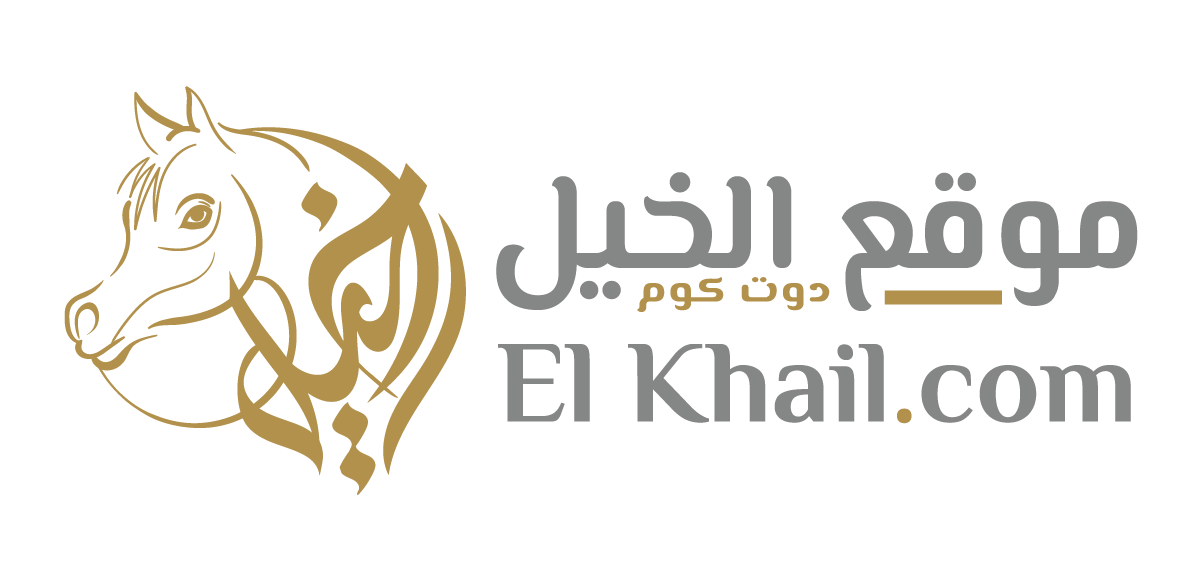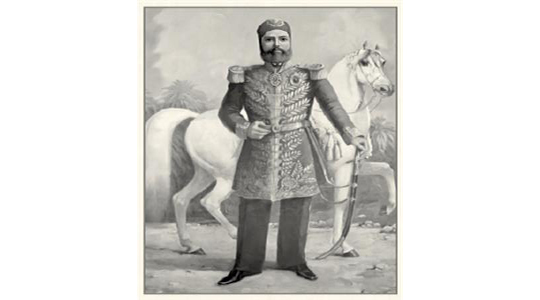He acquired the best Arab breeds … and friendship brought him together with “the founder of the second Saudi state.”
He chose the balconies of his house to look out over the “stall” and not lose sight of him … He spent a million pounds on building the Casablanca stables … and bought two horses from Prince Faysal at fantastic sums … He spent 500 pounds on a trip to search for his horse in India ..
Abbas Hilmi Pasha acquired the best horse breeds in the Arabian Peninsula and the world, and he used to frequent the valleys of the Arabs, and lived in one of its tribes, the “Al-Rolla Al-Anaziya” tribe, for nearly a year, where he moved between the tribes of the north of the island, and loved the life of the Bedouins, where he knew their sheikhs, their men and their knights, So he loved him and loved them, and he became one of them in his habit and morals.

Abbas Helmy Pasha was born in the city of Jeddah in the Hijaz, grew up in it, dealt with horses coming from the Arabian Peninsula with great interest and interaction, and acquired the best breeds from them, and a close friendship arose between him and Prince Faisal bin Turki Al Saud, “founder of the second Saudi state.”
With Abbas Pasha’s rule in Egypt after the death of his uncle Ibrahim Pasha in the year 1848, Prince Faisal sent him a number of crimes against horses in the Arabian Peninsula, which are among the most valuable gifts to his heart that is passionate about the love of purebred Arabian horses, and after the arrival of the “gift” to the Khedive Abbas Pasha horse stud in Cairo He had a state of happiness, to send a message to the ruler of Najd, Imam Faisal bin Turki Al Saud, about the origins of these horses, so that the imam would reply to him that they came from one of his horse stables from among the tribes of the Arabian Peninsula.
Imam Faisal’s advice won the attention of Khedive Abbas, and immediately he sent a number of excellent, expert and honest scribes in transmitting information, as their writings indicated that they were aware of the origins of the horses and those in contact with the tribes of the Arabs, as they were headed by the Mamluk Khedive Abbas, “Ali Bey Al-Jamashirji,” the famous Lalla, who He kept roaming the Arabian Peninsula from the end to the bottom to bring him mares from the most cherished stalls of the purebred Arabian horses, following their steps despite the distance and the difficulty of movement.
Historians mention that Abbas Pasha’s men moved between the Najd tribes and met their sheikhs and the owners of their horse stalls, in addition to everyone who had knowledge of the origins and characteristics of the horses, until they obtained the information they gathered from the narrators’s mouths and arranged it in a sophisticated and elegant arrangement that attracts attention and attracts admiration and appreciation, upon their return. To Egypt, they arranged and organized their books and presented them to Khedive Abbas Pasha in the year 1852 under the name of “The Origins of the Horse”, which some later called “Abbas Pasha’s Manuscript on Horses.”
Abbas Pasha’s friendship with Prince Faisal did not prevent him from purchasing two valuable mare with imaginary sums, namely: “Minister” a jalabiya called Jalabiya Faisal, whose origin is from Bahraini horses. It was given to Faisal bin Turki, and was sent by him to Abbas Pasha, and he paid four thousand pounds in it, and the second. The “Saqlawi jaziya”, one of the Rolla horses, was weak and unable to travel long; So I was transported from the homes of Rolla in Syria on a cart until it reached Cairo, and he paid a thousand pounds in it.
In addition, Lady Anne Blunt pointed out in her book “Hajj to Najd,” the events of her journey with her husband to northern Najd and the Arabian Peninsula in 1297 AH, and that the “old Saqlawi” that Abbas Pasha bought was from the horse of Imam Faisal bin Turki. She gave birth to two foals in Egypt, one of them died and the other was gifted to the King of Italy.
While the author of the book “The Arab Horse” says: This authentic Saqlawi that Abbas Pasha brought on a bull wheel is the supreme mother of the Saqlawi origin in Egypt, and from her daughter, grandchildren and granddaughters, the Saqlawi mares were born, which became the pride of the pride of the princes of the Khedivial family.
Abbas Pasha wanted to implement the Bedouin system in horse breeding, as his horses were trained near the Heliopolis area in Cairo under the leadership of Bedouin experts from tribes known for their care for horses such as: “Otaiba, Mutair, Goat, Shammar, and Al-Hanadi,” so he entrusted them with managing the horse house in which his palace was built And he made his balconies overlooking the horse stall so that he would not lose sight of him.
The Khedive recommended his ministers to live in houses adjacent to the area that was later known as Abbasiya, which he attributed to him, and he overcame all the difficulties that he faced in rebuilding the purebred Arabian horse stables belonging to his grandfather, Muhammad Ali, and spent nearly a million pounds building the stables of Casablanca, which is located some distance away. Twelve miles from Cairo on the Suez Desert Road, the ruins of which still exist today, between 1850 and 1851.
The stall was provided with a water tank that was filled with water brought on the backs of camels directly from the Nile, and the place was cut off from people and Abbas Pasha visited it from time to time, and no one knew what was going on in this place, because the area is surrounded by heavy guard that receives its orders from Abbas Pasha himself.
Historians point out that Khedive Abbas allocated a number of camels to feed “young horses” and foals with their milk, as the camels were raised and fed for horses during his reign. Poisoning, antibacterial, and the advantage of containing vitamin “C”, which is a very important component in areas where fresh fruits and vegetables are not available.
Among the strange stories also about Abbas Pasha’s love for horses, his love and appreciation for the horse is that he gifted the Queen of Britain the Saglawi horse “Derby”, but this gift was not valued and sold to India, and it is said that upon learning of selling it, he became very angry and sent to the Bedouins who raised the horse and said to them: “Is it? Distinguished “Derby”? So they swore that they would distinguish him from among a thousand similar horses, so he sent them to India with a reliable representative, to actually return with the horse, where the search journey took nearly a year and that period cost about 500 pounds.
When Abbas Pasha heard of a purebred mare or horse, he would send the horse’s owner a request to buy it, and he would like him for money and multiply for him, as the poetry of the Arabian Peninsula abounds in the poetry of the island’s knights as a response to Abbas Pasha’s refusal to sell their horses.
Abbas Pasha was so proud of his European horses, so that the German Baron Julius von Hegel, head of the “Vuurtemburg” farm, who came to Cairo to buy Arabian horses from Abbas Pasha for the benefit of King “Württemberg”, who established an Arabian horse stud in 1817, says in his memoirs of his meeting with Abbas Pasha:
“He does not talk a lot about horses in front of anyone, lest they ask them from him, and when I met him by chance with a crowd of his regrets, I lured him to talk about horses in general, so I might explore his principles about horse breeding, so he started asking about Europeans importing horses, then he talked about the specifications of horses. Arabia and its importance. After answering his questions, he said: “Although I am sure that you have succeeded in raising purebred Arabian horses in Europe, you should not imagine that what was born with you are purebred Arabian horses; Because there are characteristics that are not born in the Arabian horse, but only acquired as long as he breathes the desert air.
Abbas Pasha followed the experience of acquiring horses from their stalls by way of partnership, whereby the Bedouins would offer him the best of their horses on the condition that they receive a dowry or dowries born from them, and without this condition the Bedouins would not be satisfied with the separation of their horses, which they used to present to him in any way, and in the like These times Abbas used to host the Bedouins and give them gifts, so his influence over the tribes was strong a lot.






